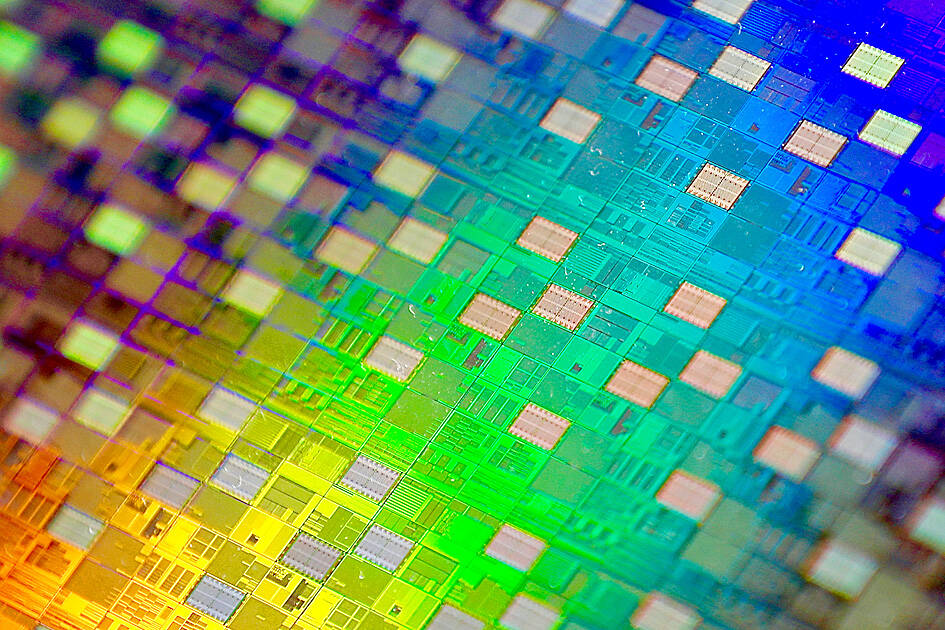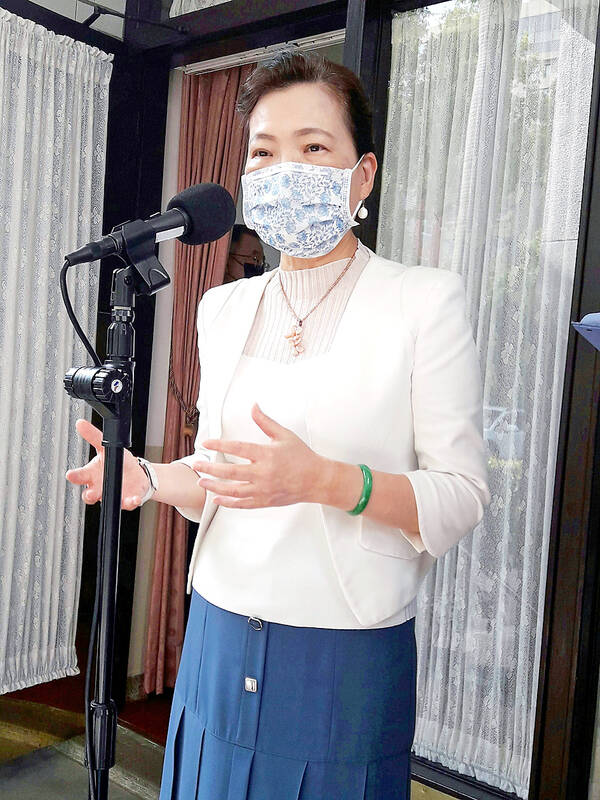The US convened a preliminary meeting of a working group with East Asian countries, including Taiwan, to discuss semiconductor supply chain resilience and cooperation, Minister of Economic Affairs Wang Mei-hua (王美花) said yesterday.
“We exchanged views at a first preliminary meeting and hope everyone can discuss how to collaborate in the future on supply chain problems like the ones we recently encountered,” Wang told reporters in Taipei.
The global chip shortage, which over the past two years has wreaked havoc on supply chains and forced automakers to halt production, thrust chip powerhouse Taiwan into the spotlight and made supply chain management a bigger priority for governments around the world.

Photo: EPA-EFE
The preliminary meeting of the working group — dubbed “Chip 4” — also included representatives from South Korea and Japan, Wang said.
Details about the frequency of future meetings, including their schedule and topics, were not addressed, she said.
The countries are home to critical players in the global semiconductor industry, including Taiwan Semiconductor Manufacturing Co (台積電), the world’s largest contract chipmaker; South Korean memorychip giants Samsung Electronics Co and SK Hynix; and key Japanese suppliers of semiconductor materials and equipment.

Photo: CNA
President Tsai Ing-wen (蔡英文) last month told visiting US lawmakers that Taiwan is committed to ensuring its partners have reliable supplies of semiconductors, which she called “democracy chips,” and urged Taiwan-friendly governments to boost collaboration amid intensified threats from China.
The South Korean Ministry of Foreign Affairs said the country’s top representative in Taiwan attended a preliminary meeting of “the US East Asian Semiconductor Supply Chain Resiliency Working Group” on Wednesday, hosted by the American Institute in Taiwan (AIT).
The AIT did not immediately respond to a request for comment.
Kyung Kye-hyun, who heads Samsung’s chip business, last month said that his company has conveyed concerns about the proposed Chip 4 alliance, including the need for South Korea to seek China’s understanding before any negotiations.
Additional reporting by CNA

INVESTIGATION: The case is the latest instance of a DPP figure being implicated in an espionage network accused of allegedly leaking information to Chinese intelligence Democratic Progressive Party (DPP) member Ho Jen-chieh (何仁傑) was detained and held incommunicado yesterday on suspicion of spying for China during his tenure as assistant to then-minister of foreign affairs Joseph Wu (吳釗燮). The Taipei District Prosecutors’ Office said Ho was implicated during its investigation into alleged spying activities by former Presidential Office consultant Wu Shang-yu (吳尚雨). Prosecutors said there is reason to believe Ho breached the National Security Act (國家安全法) by leaking classified Ministry of Foreign Affairs information to Chinese intelligence. Following interrogation, prosecutors petitioned the Taipei District Court to detain Ho, citing concerns over potential collusion or tampering of evidence. The

Seventy percent of middle and elementary schools now conduct English classes entirely in English, the Ministry of Education said, as it encourages schools nationwide to adopt this practice Minister of Education (MOE) Cheng Ying-yao (鄭英耀) is scheduled to present a report on the government’s bilingual education policy to the Legislative Yuan’s Education and Culture Committee today. The report would outline strategies aimed at expanding access to education, reducing regional disparities and improving talent cultivation. Implementation of bilingual education policies has varied across local governments, occasionally drawing public criticism. For example, some schools have required teachers of non-English subjects to pass English proficiency

‘FORM OF PROTEST’: The German Institute Taipei said it was ‘shocked’ to see Nazi symbolism used in connection with political aims as it condemned the incident Sung Chien-liang (宋建樑), who led efforts to recall Democratic Progressive Party (DPP) Legislator Lee Kun-cheng (李坤城), was released on bail of NT$80,000 yesterday amid an outcry over a Nazi armband he wore to questioning the night before. Sung arrived at the New Taipei City District Prosecutors’ Office for questioning in a recall petition forgery case on Tuesday night wearing a red armband bearing a swastika, carrying a copy of Adolf Hitler’s Mein Kampf and giving a Nazi salute. Sung left the building at 1:15am without the armband and apparently covering the book with a coat. This is a serious international scandal and Chinese

NEGOTIATIONS: The US response to the countermeasures and plans Taiwan presented has been positive, including boosting procurement and investment, the president said Taiwan is included in the first group for trade negotiations with the US, President William Lai (賴清德) said yesterday, as he seeks to shield Taiwanese exporters from a 32 percent tariff. In Washington, US Trade Representative Jamieson Greer said in an interview on Fox News on Thursday that he would speak to his Taiwanese and Israeli counterparts yesterday about tariffs after holding a long discussion with the Vietnamese earlier. US President Donald Trump on Wednesday postponed punishing levies on multiple trade partners, including Taiwan, for three months after trillions of US dollars were wiped off global markets. He has maintained a 10 percent